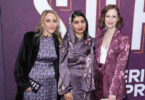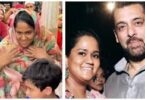Monitoring Desk
G. Willow Wilson is well known to comic book readers as co-creator of Ms. Marvel, and more recently as writing for the Wonder Woman series, but she’s also an accomplished novelist, praised for her debut novel, “Alif the Unseen,” and the recently released “The Bird King.”
Wilson, 36, will be in Madison to talk about her latest book Tuesday evening at the Central Library as part of the Wisconsin Book Festival.
Set in 1491, “The Bird King” is a platonic love story between Fatima, a 17-year-old concubine in the royal court of Granada, the last emirate of Muslim Spain, and her best friend, Hassan, the palace mapmaker. Hassan draws maps of places he’s never been, and some become real once he dreams them up.
Wilson, who converted to Islam at age 20, is happy to be coming back to Madison, where she’s been twice before, most recently for five days in 2013 as a fellow at the UW–Madison Lubar Institute for the Study of the Abrahamic Religions.
“It’s a really lovely Midwestern college town,” Wilson said last month from New York, where she was making an appearance at the New York Public Library two weeks into her biggest-ever book tour, which started March 7 and runs until April 24 with 17 appearances.
“I think the great thing about a city the size of Madison is it still feels like a small community, but it’s got so much going on because of the university and because of its own history,” she said. “It just feels like a very vibrant, connected place.”
Wilson’s tour is broken up with trips back home to Seattle, where she lives with her Egyptian-born husband and her 6- and 8-year-old daughters. She’s able to tour for a week and then be home for a week and then go back on the road again.
Q: How have audiences been receiving the book?
A: I’ve gotten some really great feedback, from book bloggers, from early readers who have been showing up at events. It seems that there’s a lot of enthusiasm, which is great. It’s tough to know when you’re working in the solitude of your office, how the finished product is going to be received by the audience. So it’s really wonderful to be able to meet people who’ve enjoyed the book.
Q: “The Bird King” is set in 15th century Muslim Spain and your degree is in history. Did your love of history and your Islamic identity give you an interest in that period of European history?
A: Yeah, it’s an interesting time period. I think growing up, most Americans hear 1492 and we think of one thing and that is the voyage of Columbus and what we don’t tend to learn is that it’s also the year that the very last city of Muslim Spain fell to Ferdinand and Isabella. It was a time of tremendous upheaval in Europe, as well. So it’s a really interesting time period for me when a lot of change was happening and there are a lot of potential fascinating stories to be told.
Q: You’ve said that the cultural and political upheaval of that time and place parallel what is going on now in so many ways.
A: I think that’s really true. Questions about identity, about how long you have to live in a place before you’re considered from that place, about who belongs where and borders. These are issues that we have obviously not resolved for ourselves here in the 21st century. So it’s interesting to me to see that very similar discussions were happening 500 years ago. So clearly these are questions that are not easily settled.
Q: Can you talk a bit about your conversion to Islam? In your memoir, “The Butterfly Mosque,” you say that you were brought up by atheist parents. And you’ve said that your search for religion developed during your sophomore year in college. You’ve written that Judaism “was a near perfect fit, but it was created for a single tribe of people.” Can you explain what about Islam drew you?
A: I knew I was a monotheist of a very particular kind. And Islam so succinctly described the nature that I believed God possessed, that I think it was pretty inevitable that I would be drawn to that. So it was really a matter of searching for a tradition that reflected things that I believed about the nature of God kind of innately.
Q: Then right after your introduction to Islam, it was a few weeks later that 9/11 happened and that made you question your beliefs?
A: Yeah, that’s true. I think anytime somebody commits an act of horrible violence and claims to have done it in the name of a particular ideology, whether it’s political or racial or religious, it gives one pause: Am I right about this or are they right about this? I think it’s something that we as a society are still grappling with because certainly political and racial and religious violence is something that still affects us today. And it’s caused everybody to kind of reflect on their own beliefs and assumptions about the world and wonder which of those deeply held beliefs we’re not willing to seed to extremists and how we’re going to fight that.
Q: I’m wondering how you were affected by the recent mosque shootings in New Zealand where 50 people were killed and 50 injured by a white supremacist.
A: It was really devastating. And particularly as a parent wanting to shield one’s children from the scarier realities of the world in which we live. You really have to ask yourself some soul-searching questions about what to tell them, what to keep from them. And then just walking around thinking “how safe am I? Are there going to be copycats? When is this going to end? When are we finally going to have the discussions as a society that we need to have about this kind of violence?” So, it really resonates and ripples throughout the entire Muslim community and really the entire world when something this terrible happens.
Q: In 2014 Marvel reimagined the Ms. Marvel series and had you write it. Do I say that you were the co-creator of Kamala Khan?
A: Yes.
Q: Did you set the story in New Jersey because that’s where you grew up?
A: Yes, partially. It’s where I grew up. It’s where Sana Amanat, the co-creator, also grew up. So it’s part of our kind of shared history. It’s also a convenient place to set a new superhero story in the Marvel Universe because so many classic Marvel heroes are based in New York. So the idea of having this superhero right across the river in a place that often gets overlooked, seems symbolically really appropriate.
Q: The reaction must be gratifying. The first issue reached a rare seventh printing.
A: Yeah, that’s really unusual.
Q: In a blog post you said that a big reason Ms. Marvel has struck a chord is because it deals with the role of traditionalist faith in the context of social justice, and there was apparently an untapped audience of people from a wide variety of faith backgrounds that were eager for a story like this.
A: That’s certainly the impression I got because I get fan mail from people of faith outside of Muslim backgrounds — Orthodox Jews, people of Mormon backgrounds. Anybody who grew up having to balance their faith with the realities of secular, modern life and to try to strike that balance. It seems to have struck a chord.
Q: What about a backlash? What have you seen in terms of a backlash against a female Muslim hero?
A: It’s definitely there. As we’ve seen, there is kind of an organized reactionary backlash against anything that does not conform to what a particular segment of society believes America should look like. We’re not alone in getting that backlash. I think (we’ve) seen it against a lot of stories about female characters, about minority characters of all kinds, and anything having to do with immigrants. So I think you can’t dissociate it from the larger cultural conversation that we’re having at this moment.
Q: It was late last year when you began writing Wonder Woman for DC Comics and she’s such a famous, enduring female superhero. You’d already written previously for DC with Superman, Vixen and the Outsiders. Still, it must’ve felt like such an honor to be chosen to write Wonder Woman.
A: Yes. I was very honored to be given that assignment, and it’s been really fascinating to write a character who has upwards of 80 years of history and to try to bring new and fresh and interesting stories to a character who is so beloved by so many.
Q: How hard is it to switch gears between writing novels and writing comics?
A: It’s a very different skill set. I think with prose you have a lot of latitude to include subplots. There’s not a hard and fast restriction on the length of the book. In comics, the structure is kind of the boss. You have to write 20 page stories, not 19, not 21. You’re really kind of beholden to the way that that medium works and you have to make your story work within that very strict structural specification. So it’s not an easy thing. It takes a lot of practice to get comfortable with that very demanding structure. But it’s good practice I think for anybody who wants to be a better writer. So I think it’s helped me improve my prose.
Courtesy: (madison.com)






